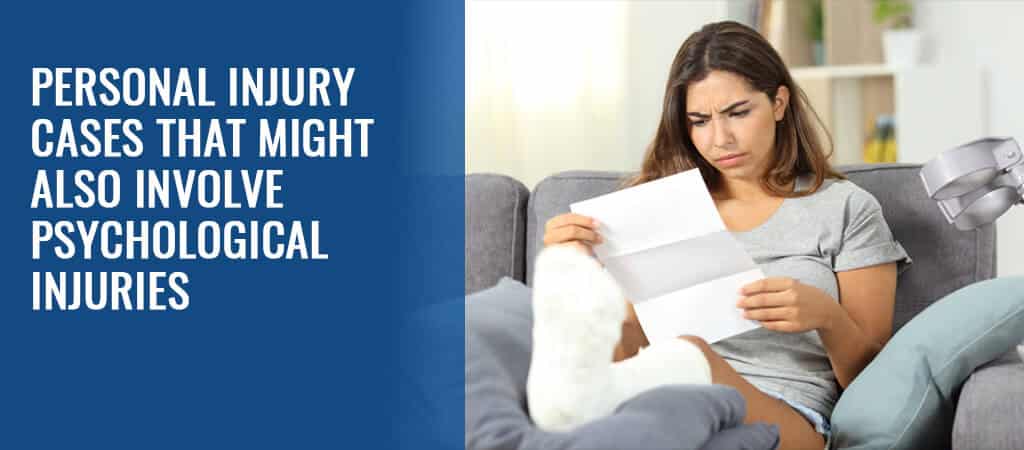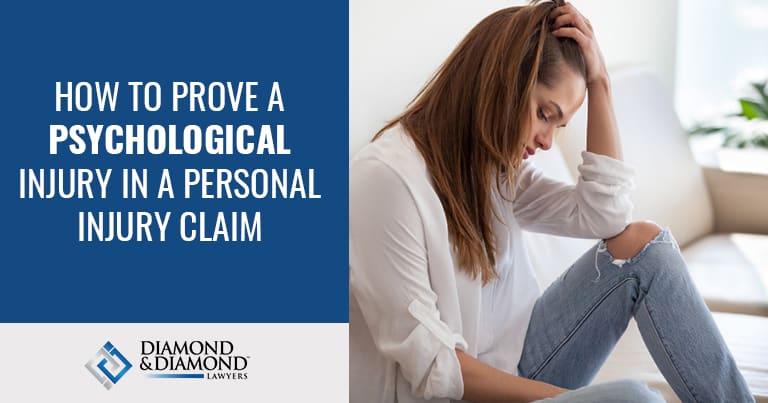When someone is injured through an accident or negligence, it often results in a personal injury claim.
Most of us probably associate the idea of personal injury law with physical injuries. However, traumatic accidents can produce psychological damage as readily as they produce physical damage.
In Canada, you can seek compensation for these psychological injuries in the same way you might seek compensation for physical injuries: through a personal injury claim.
Let’s take a look at the details.
Types of Psychological Injuries Caused by Accidents
Any traumatic experience has the potential to produce psychological injury. This injury can manifest itself in any number of conditions or symptoms, of which a person may experience one or multiple after the accident.
Some of the most common psychological conditions and symptoms experienced as a result of psychological injury include:
- Depression: Depression can often present itself after suffering a loss, a physical injury, or in the wake of a stressful or traumatic event. Depression can significantly reduce a person’s ability to function in day to day life, compromise their enjoyment of their life and hobbies, and lead to severe changes in behavior.
- Anxiety and Stress: Anxiety can often accompany recovery from an injury, or simply manifest as a result of the circumstances of an accident, Anxiety can make it difficult to function in daily situations and cause undue stress.
- Sleeping Disorders: Sleeping disorders can often present themselves after an accident. They may be related to increased stress and anxiety, be related to pain and soreness from an injury, or be associated with other psychological issues.
- Post-Traumatic Stress Disorder (PTSD): PTSD can trigger extreme emotional episodes involving intense emotions, irritability, or inability to be excited. Other symptoms often include flashbacks, nightmares, aggressive behavior, and disturbing or uncontrollable thoughts.
- Phobia: Some of us develop a phobia (an intense fear) as a result of an accident. This could be a fear of traveling by highway after an automobile accident, or a fear of going to stores after being injured in an accident in a supermarket.
Proving a Psychological Injury in a Personal Injury Claim
Where a physical injury can be simple to prove with the aid of physical evidence, psychological injuries are invisible. They lurk beneath the surface, making the burden of proof more difficult.
To establish that someone has a psychological injury that another party is liable for, not only must the injury itself be proven, but it must also be demonstrated that the injury was the result of the accident in question.

In order to prove your psychological injury claim in Canada, you will need to:
Establish that the injury is significant
You’ll need to show that the injury is a serious one which has a real impact on your life.
The criteria for a significant injury include:
- Severity: The injury must be severe enough to have a serious impact on your life, either ongoing or in the past.
- Duration: The injury must be shown to have persisted for an extended period of time, and be “beyond the normal annoyances” experienced by most people.
Establish a causal connection
In order for another party to be liable for your psychological injury, you must demonstrate that the psychological injury was the direct result of the accident for which the other party is liable.
This means that you need to demonstrate that your symptoms presented themselves after the accident, and that they were not the result of other factors (such as drugs or disease.)
Obtain an Expert’s Opinion
Although a 2017 ruling by the Supreme Court of Canada decided that expert evidence is no longer required to establish psychological injuries, the opinion of a psychiatrist or mental health expert can still provide a valuable piece of evidence in establishing psychological injury.
It’s a good idea to get in contact with a psychological expert who can help assess you and potentially diagnose your condition. This information can later be used to establish your psychological injury as part of your personal injury claim.
Gather Testimony from Friends, Family, and Colleagues
In key cases such as Saadati vs Moorhead, the testimony of friends and family proved instrumental in pivoting the psychological injury claim.
Your friends and family, as well as any associates and colleagues who you work with regularly, can provide testimony to changes in behavior or psychological symptoms which manifested in you after the accident.
This testimony must be consistent from all parties, with no witnesses offering contradictory testimony.
Personal Injury Cases That Might Also Involve Psychological Injuries
Accidents are traumatic both physically and psychologically. It’s not uncommon for psychological injuries to accompany personal injury cases at all.
Some of the most common types of accidents which result in both psychological injuries and personal injury claims include:
A psychological injury can be every bit as debilitating as a physical injury. Don’t leave the compensation you deserve sitting on the table. Consult Diamond & Diamond today to get the best in the business working on your psychological injury claim.
Contact a Psychological Injury Lawyer at Diamond & Diamond Today
At Diamond & Diamond, we understand that a psychological injury is a very personal and complicated matter.
We want to work closely with you to provide you the legal support necessary to assist you in recovering from your injuries — both physical and mental.
With a wealth of knowledge and a breadth of experience in personal injury claims, Diamond & Diamond is equipped and ready to assist you with your psychological injury claim.
Want to find out exactly what we can do for you? Your initial consultation is completely free!
You can schedule today by visiting our website and using our online contact form.
Or you can call us toll free at our 1-800 number.
Prefer doing things in person? Visit any of our offices across Ontario.
PRO TIP:
“After an accident, something as simple as talking to your loved ones — or a counselor — can help preemptively counter any psychological issues.”

